by Emma Albertoni, University of Denver and Umbra Rep Fall ’19
Studying abroad can be one of the most exciting, wonderful, and rewarding experiences during a student’s time in college. Many universities offer programs all over the world for students to apply to and resources to help them get everything they need to get where they need to be. Studying abroad gives you the opportunity to learn in a classroom with talented professors around the world and allows you to learn about different opinions, teaching styles, and ideas while contributing to your education. It allows you to travel to exciting places seeing beautiful landscapes, architecture, and history everywhere. By living in a different country for a semester, you get to learn about a new culture while living in it; seeing local people interact with their environment, listening to their language and how they speak it, their thoughts and opinions on things, what they value and what they don’t, how they do things differently than your own culture, and more. You learn just as much (if not more) about yourself as you learn about the culture, too. Trust me when I say if I could do this again, I would do it in a heartbeat.

I don’t believe that it is a surprise to anyone that, while studying abroad can be an amazing experience, it can also be very challenging. You’re in a foreign country, where you might not know the language very well, if at all. The culture might be very different from your home culture, which can be very shocking and can take a little while to get used to. You may not know anyone in your program and feel isolated from your friends and family back home due to time changes and physical distance. However, all of these are completely normal feelings to have. I can guarantee you that if you asked any student who is studying or has studied abroad, they would agree that they felt these feelings at some point during their semester abroad. I definitely felt feelings of homesickness and anxiousness while I have been abroad, which is why I wanted to write a blog post for future study abroad students to give you some advice for your time abroad!

1. Listen to yourself!
I first want to reiterate that it is completely normal to feel homesick/sad/anxious/nervous/etc. leading up to and during studying abroad. It is also okay to not have any of these feelings. Everyone prepares and reacts to new experiences, new environments, and new obstacles differently. You are the only one who knows what’s best for you, so listen to yourself. Take time to figure out what works for you and seek out what you need. Don’t be afraid to ask for help from advisors, professors, administrators, health care professionals, friends, or family during the process leading up to going abroad and during your abroad experience. No matter where you go or which program you select, you will most likely have someone that you can go to for questions, help, or just talk to when you need an ear.

2. Let it out
The day I left for Perugia, I was so excited and ready to jump into it that I couldn’t sleep the night before, and I kept imagining all the amazing things I would be able to experience. I also sobbed all the way through security in the airport to my gate, to the point where strangers asked if I was okay. I look back and laugh about it now – and yes, you can laugh at me too – because I knew I would be just fine, but I couldn’t stop crying. It was how I was feeling at the time, and it was how I wanted to handle the emotions I was experiencing. I knew I would be okay, and I knew I would have an amazing experience abroad, but I was nervous to be away from my family and in a new place on my own. Completely. Normal. Feelings. I just needed to let them out.
Time magazine’s Hilary Jacobs Hendel wrote an article about how ignoring your emotions can be bad for your health. She discusses how a person’s brain processes emotion and how it affects your body. Not acknowledging how you’re feeling can lead to increased chances of anxiety, depression, or stress, as well as physical symptoms like insomnia, headaches, or intestinal issues. It’s better for your mental and physical health to acknowledge your feelings and release them in some way than to keep them bottled up and festering inside your head. You can draw them, talk about them, write about them, scream, hit a pillow, or release them in whatever way you prefer!

3. Take Care of Your Mind and Body
We all have been told that eating well, staying hydrated, getting enough sleep, and exercising is good for our health. Studies have shown how these aspects of health improve mood and promote mental wellbeing!
When you first get to your program, adjusting to the time change is important. Try not to nap during the day and go to bed between 10:00 pm and midnight so you can get at least 7 hours of sleep. Try to stay consistent with getting 7 hours of sleep throughout the semester as well, as it can help your productivity and focus as well as your mood. And then, instead of napping, you can explore new places!
Make sure to stay hydrated by bringing a reusable water bottle and drinking safe drinking water. Here in Italy, the tap water is safe to consume. In many Italian cities, there are fountains with signs that say “Acqua Potabile” that you can drink from as well.
While pizza and pasta are plentiful and delicious in Italy, make sure to eat enough and eat a balanced diet that includes vegetables and protein. My roommates and I love to make pasta with pesto sauce or red sauce and add in prosciutto, Italian sausage, eggs, eggplant, zucchini, tomatoes, mushrooms, garlic or onions, depending on what we have and what is in season. We’ve also made big batches of vegetable soup and chicken noodle soup that we can store in the fridge and eat throughout the week.
Exercise is also shown to be greatly correlated to mood. If you study abroad, especially in Europe, you’ll be walking a lot. However, take opportunities to go for a run, follow yoga videos on YouTube, or look up exercises you can do in your apartment without equipment. In Perugia, there are also some nearby gyms that you can buy memberships to if you prefer. (See Kate Donati’s workout tips.)
Also, participate in self-care! Do a facemask, listen to some music and scream along to the lyrics, watch a movie, eat a cupcake (see Taylor Feehan’s post on the student favorite restaurant Pinturicchio, they have delicious cupcakes).

4. Bring Comfort Items
Bringing something from home might provide you comfort when you are feeling homesick, anxious, or lonely. I personally brought a stuffed animal bear, a blanket, and some letters and notes from loved ones that I have collected and saved over the last couple years. At the beginning of the semester, I would curl up with my blanket and call my mom or read through my notes before I went to bed. It wasn’t exactly home, but it was a piece of it, and it reminded me that home wasn’t as far away as it seemed at the time. Saving room in your suitcase to pack something small from home might be something you could consider, especially if you haven’t been far from home before and are anticipating homesickness.

5. Stay in Touch
As much as I wanted my family to come live in Italy with me for the four months I was here, it wasn’t a possibility. But for me, it was incredibly important that I had the ability to call, text, Facetime, Skype, email, send snail mail, or get to talk to them in some way on a regular basis. I made sure before I left to research and get a phone plan that worked for me. I ended up using the phone plan that Umbra offered at the beginning of the year in a partnership with Vodafone. It gives me 500 minutes of international calling, unlimited calling within Italy, and 35 GB of data a month (which for me is plenty, especially if I try to stay on Wifi during the week so when I travel on the weekends I don’t have to worry). I try and keep in contact with my family and my friends who aren’t here with me and talk to them a few times a week.
Find a way to keep in touch with your family, even if it is just Skyping over Wifi a couple times a week. It will help you feel less isolated, less lonely, and feel like you aren’t missing out on things going on at home. Plus, you’ll get to share all the amazing things you’re doing and seeing with the people you love!

6. Surround Yourself with Positive and Supportive People
Everyone that you’ll be studying abroad with is in the same situation; in a new place and culture with new people. Everyone will be somewhat unsure at first, and chances are they’re afraid they won’t make friends, just as you might be. I was worried about this at first too. However, a study abroad opportunity allows you to make friends in this unsure situation, which brings you together with people in a different way and makes you closer as friends in the long run. I can guarantee you’ll find friends who will travel and do things with you while you’re abroad! But also make sure that you surround yourself with good people who will support you while you’re here, so that you have someone to talk to who might be feeling a similar way. You can help each other work through any emotions and problems you’re having, and keep each other accountable throughout the experience!

7. Find Structure
Structure in your day to day activities can provide you with a sense of normalcy and expectation, especially in a setting like study abroad where everything can feel radically different. You can start to feel like you have control of your surroundings and begin to plan out what you want out of your abroad experience as well. Starting classes, planning out activities with your new friends, and scheduling time to explore the city you’re living in is a great way to start living in a new place.

8. Keep Busy and Go Places
One of the best ways I found to feel better when I first got to Perugia was to keep busy with school or activities, as well as leave my apartment to explore Perugia, Italy, and Europe. I found that by immersing myself in the culture, seeing amazing places, and sharing experiences with people, I kept myself from feeling lonely and homesick, and distracted myself with excitement and wonder. Sure, I still missed home while I went out and did things, but it reminded me why I came abroad in the first place; to gain independence and prove to myself I can do things on my own.

9. Try New Things
It’s always scary going into the unknown, but it’s an important part of personal growth, because it forces you to learn about how you handle different situations. Try to move just outside of your comfort zone (in a safe way) and experience new things while you’re abroad. This could be interpreted however you want and in whatever ways work for you! Start small by going to a café by yourself or ordering a new kind of food you haven’t tried before. Don’t push yourself too much and be smart about your safety, but study abroad is a great time to experiment. You’ll learn more about yourself and grow more as a person than any other time in your life!

10. Use Your Resources
Many study abroad programs offer several different resources to help students adjust to their new environment and provide support, advice, or an ear whenever necessary. At the Umbra Institute, for example, they has several very kind, open, and knowledgeable administrative staff members available to students to help them with different needs. Some of the key ones I will mention are Renilda Zajmi, the Coordinator for Student Health and Well-Being (she’s very helpful, she has gone with me to find the right medicine at the pharmacy and she has helped friends of mine get doctor’s appointments) and Alessandro Varazi, the Housing Coordinator (he’s a very nice and patient man, he helps with any housing questions you have, even if it’s getting you a new lightbulb or fixing the Wifi several times).
I can’t mention Umbra Institute’s fabulous resources without mentioning the counselor and psychologist who partners with the Umbra Institute to provide students with an outside resource that doesn’t answer to the school and will keep any and all information private. She holds open office hours at the school for anyone who needs them throughout the semester, and she’ll set up appointments with you through your insurance if you would like more support. I can’t express to you how much I appreciate her help; she’s very supportive and open and is happy to help any student with any issue at any time! She has helped me immensely by working and talking with me through some of my homesickness and anxieties since being abroad.
If you don’t feel comfortable with anyone at Umbra (or end up at a different program), International SOS (ISOS) has some amazing resources all over the world and are available 24/7 over the phone or through email. They offer resources for both doctors and counselors and are very nice and helpful when you call them. My school required students studying abroad to call them before we left to open a ‘file’ with them, just by asking a few questions about what they offer, medications we took and how we might find them in the country we were going to, and any other questions we might have had.
Bonus tip
Pet the dogs! There are many studies on how animals make us feel better. Plus, who doesn’t want to pet a cute dog on the street? In Italian, you can ask the owner, “Posso accarezzare il tuo cane per favore?” or just ask, “Posso?” and wave your hand near the dog. I have found the dog owners here in Perugia are very nice and will let you pet their dog for a couple minutes!

https://time.com/5163576/ignoring-your-emotions-bad-for-your-health/
https://www.mhanational.org/helpful-vs-harmful-ways-manage-emotions
https://aspiria.ca/maintaining-mental-health-studying-abroad/
https://www.psychologytoday.com/us/blog/what-works-and-why/201803/how-your-mental-health-reaps-the-benefits-exercise
https://www.nopanic.org.uk/dehydration-anxiety/
https://www.umbra.org/about/onsite-staff/
https://www.internationalsos.com
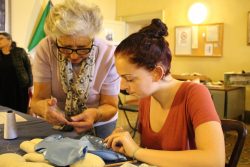
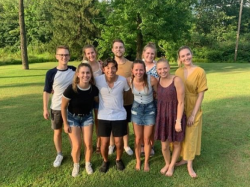


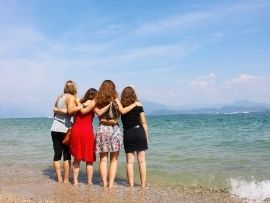 1) Set goals and make waves.
1) Set goals and make waves.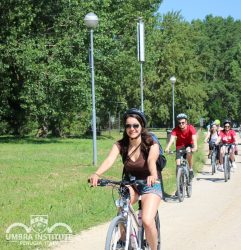 3) Plan travel around studying, not the reverse.
3) Plan travel around studying, not the reverse. 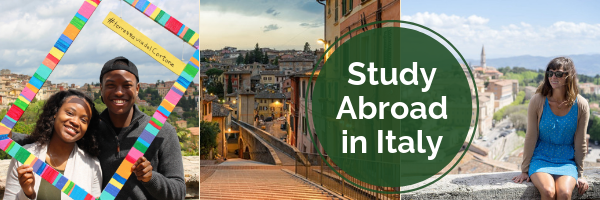
 When students choose to study abroad in Italy, one of the first things on their minds is the beauty found in walking through medieval streets, strolling across aqueducts, or meandering through museums. Italy certainly knows how beautiful she is and wants everyone to have the opportunity to experience her world-renowned art and history. For this reason, Italy allows all locals and visitors alike to tour museums for free on the first Sunday of every month!
When students choose to study abroad in Italy, one of the first things on their minds is the beauty found in walking through medieval streets, strolling across aqueducts, or meandering through museums. Italy certainly knows how beautiful she is and wants everyone to have the opportunity to experience her world-renowned art and history. For this reason, Italy allows all locals and visitors alike to tour museums for free on the first Sunday of every month!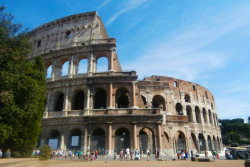 Current and future students are encouraged to plan their travel accordingly in order to take advantage of this wonderful opportunity.
Current and future students are encouraged to plan their travel accordingly in order to take advantage of this wonderful opportunity. 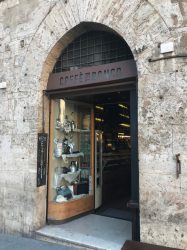
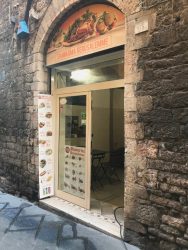 2. Shawarma Gerusalemme – Shawarma Gerusalemme is located a bit farther from Umbra, toward the bottom of Via dei Priori. The food is delicious and fresh, so I assure you that it is worth the walk. Some of their lunch options include Kebab Panino, Panino Hamburgher, Falafel e Humus, Patatine, and even Hot Dogs. The first time you eat here, I would recommend that you ask for a “punch card”. If you bring the punch card each time you eat at Shawarma Gerusalemme, your 11th meal will be free—great for students on a budget!
2. Shawarma Gerusalemme – Shawarma Gerusalemme is located a bit farther from Umbra, toward the bottom of Via dei Priori. The food is delicious and fresh, so I assure you that it is worth the walk. Some of their lunch options include Kebab Panino, Panino Hamburgher, Falafel e Humus, Patatine, and even Hot Dogs. The first time you eat here, I would recommend that you ask for a “punch card”. If you bring the punch card each time you eat at Shawarma Gerusalemme, your 11th meal will be free—great for students on a budget!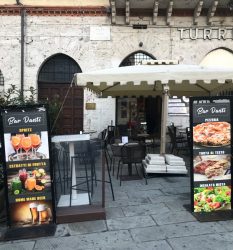 3. Bar Danti – Bar Danti is located in Piazza Danti less than a 3 minute walk from Umbra. They have outdoor seating when the weather is nice and the staff is some of the nicest people I have met while abroad. If you get to know the owners they will treat you like family. Bar Danti has a large array of options including salads, pizza, torta al testo, and smoothies. It is a great place to sit and have a quick lunch with friends.
3. Bar Danti – Bar Danti is located in Piazza Danti less than a 3 minute walk from Umbra. They have outdoor seating when the weather is nice and the staff is some of the nicest people I have met while abroad. If you get to know the owners they will treat you like family. Bar Danti has a large array of options including salads, pizza, torta al testo, and smoothies. It is a great place to sit and have a quick lunch with friends.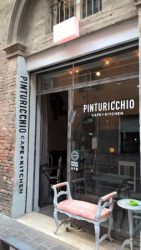 4. Pinturicchio Cafe+Kitchen – Pinturicchio is one of the only American-style cafes in Perugia, offering scrambled eggs, pancakes, cupcakes, barbecue, and much more. The atmosphere is casual and comfortable with many couches and chairs to lounge on. It is about a 10 minute walk from Umbra, but it is the perfect place to go if you want to sit, do homework, and sip a warm cup of coffee.
4. Pinturicchio Cafe+Kitchen – Pinturicchio is one of the only American-style cafes in Perugia, offering scrambled eggs, pancakes, cupcakes, barbecue, and much more. The atmosphere is casual and comfortable with many couches and chairs to lounge on. It is about a 10 minute walk from Umbra, but it is the perfect place to go if you want to sit, do homework, and sip a warm cup of coffee.


 About the Author:
About the Author:

















 According to the website,
According to the website,

 One of the best things about Italy is the fresh, sustainable, and local ingredients found in restaurants and stores everywhere… one in particular is the eggs, never will you see yolks so orange. They’re creamy, fresh, buttery, and oh-so delicious.
One of the best things about Italy is the fresh, sustainable, and local ingredients found in restaurants and stores everywhere… one in particular is the eggs, never will you see yolks so orange. They’re creamy, fresh, buttery, and oh-so delicious.
